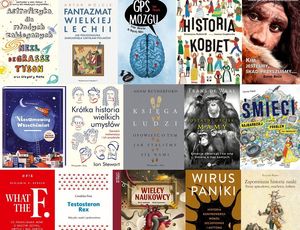
Benjamin K. Bergen and Gerda Raidt have won in the two main categories of the 5th edition of the Smart Book of the Year Award. The results were announced during the Friday award ceremony, which was streamed online due to COVID-19 pandemic. Aside from the two main awards, winners in three other categories were also revealed.
Scientific books for the general reader are a key element of science communication and, more importantly, education. It is these books that give teachers and parents a chance to stoke the flame of passion in young hearts and minds. They allow us to expand upon the knowledge passed on in schools and learn more about the most important research. The Smart Book of the Year contest aims to motivate both authors and publishers to achieve the highest standards of science communication literature in Poland. The Euclid Award, given annually to the best books, provide a guide for readers who seek interesting and reliable source of information, while at the same time serving as a token of appreciation and recognition for the authors.
‘The restriction of movement caused by the pandemic, though frustrating for many reasons, may encourage people to pick up a book. Families forced to remain within the four walls of their homes may find the time to read something together and discuss it. Books awarded in this edition of the contest will allow them to confront their own opinions with the views of the authors, who provide an insightful yet accessible outlook at the topics they chose to investigate. Why do emotions take precedence over logic? What is the purpose of swearing? These are just some of the questions. Additionally, younger readers will also find something that will draw their attention. Many hours of reading, new fascinations and reflections – you’ll find it all in this year’s Smart Books. See who won in our contest, and feel free to choose your own winners’, said Prof. Stanisław Kistryn, JU Rector for Research and Structural Funds and a member of the contest’s jury.
The award for the best book for adults was given to Benjamin K. Bergen, a professor at the University of California San Diego. His book What the F. What Swearing Reveals About Our Language, Our Brains, and Ourselves deals with the somewhat controversial issue of profanity. The author has divided swear words into four basic etymological groups. He pointed out that they have their own grammar and they are formed in a different part of the brain than our usual, everyday expressions. He argues that swear words can be beneficial for us – they can make us laugh, allow us to vent and can stimulate us emotionally.
‘I’m so honoured by this award, and honestly, quite surprised. What the F. is a book about profanity, and that might oftentimes disqualify it from an award such as this one. I wrote the book as a way to bring the science of language to people who might not know how fascinating that could be. And profanity is interesting not just for its own reasons, but also because it reveals things about the brain, how it works, how language works, that we wouldn’t otherwise know. I was ecstatic to see the Polish translation of the book, in large part because it serves as an invitation to me to learn some Polish profanity’, said Prof. Bergen.
Gerda Raidt, who received the award for the best book for children, took on the issue of the global problem with waste. She discussed the ways we can reduce their amount and if recycling can solve the problem and help the environment. Her book Müll. Alles über die lästigste Sache der Welt [Rubbish. Everything about the most annoying thing in the world] tells us not only everything there is to know about garbage, but also how to prevent our planet from an ecological disaster.
The JU academic community has given its award to the book Fantazmat Wielkiej Lechii. Jak pseudonauka zawładnęła umysłami Polaków [The phantasm of Great Lechia. How pseudoscience captivated the minds of Poles]. Did the Polish really invent the wheel, defeat Alexander the Great, found major European cities and establish one of the greatest empires in the history of mankind? If we were to believe some fringe proponents of the concept of Great Lechia. The book by Artur Wójcik clearly shows how proper knowledge and set of skills is needed to study history, and gives its readers the tools necessary to debunk any historical fallacy.
The editors of the Smart Books website awarded Seth Mnookin, an American writer and journalist, for his book The Panic Virus: A True Story of Medicine, Science, and Fear, where he meticulously and plainly exposes anti-vax theories and their sources. The author describes the history of medicine, explaining subsequent stages of its development and the simultaneous formation of groups that base their activities on fear and suspicions.
The readers of Gazeta Wyborcza have chosen Wielcy Naukowcy [Great scientists] by Marcin Jamkowski and Maciej Szymanowicz as the best science communication book published in 2019. In the book, the authors have presents interesting portraits of numerous scientists and inventors as well as the events that led to their greatest accomplishments. Its language is easily accessible to a child, while at the same time, it contains many interesting facts that can provide a useful basis to further explorations of the world.
The Smart Book of the Year contest was organised for the fifth time by the Jagiellonian University and the Smart Books website. Copernicus Festival, Kraków bookshop De Revolutionibus Books & Café, and Gazeta Wyborcza are partners of the initiative.





